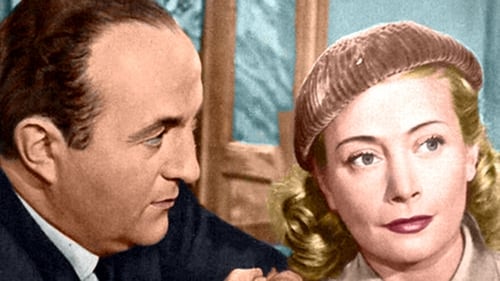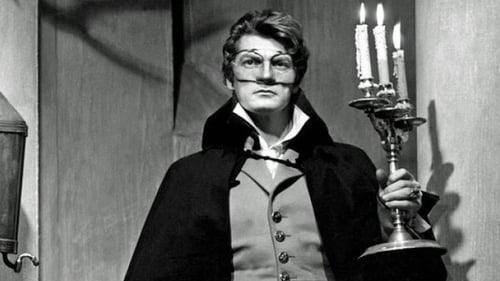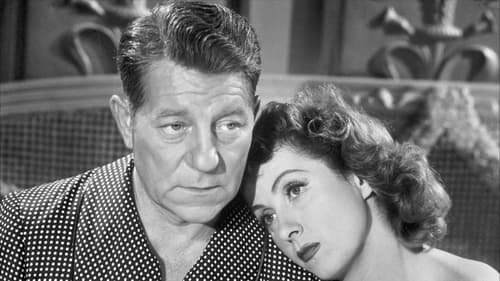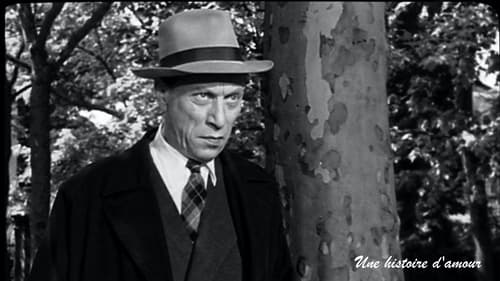
The short stories of Guy de Maupassant enjoyed a renaissance in the early 1950s, thanks in great part to the Max Ophuls production Le Plaisir. In Trois Femmes, three De Maupassant stories are dramatized, each conveying the central theme of women falling in love. In the first, a black female carnival entertainer causes an uproar when she falls in love with a white soldier. In the second, a young bride is pressured into having a baby to collect a huge inheritance. And in the final episode, a pregnant girl is "adopted" and protected by a small circle of friends. In standard De Maupassant fashion, each of the three stories in Trois Femmes is capped by a surprise twist.

Mrs. de Presbourg
Noël is a bachelor who inherits a matrimonial agency. After contemplating selling it, he chooses to manage it.

A guest
After being hurt in the face, Count de Roger Tinchebraye is forced to hide his disfigured face behind a leather mask. Dispirited for a while, he decides to become a Casanova-like seductor. When he meets true love, cynical Roger does not believe in it and lets pure Judith marry an old marquis. But once Judith's husband dies, he sees Judith again, shows her his disfigured face, which does not discourage the young woman from loving him. Nevertheless, he distances himself from her forever

François Donge, a rich industrialist and womaniser, meets a girl nicknamed Bébé who he marries. Ten years later, poisoned by his wife and dying in hospital, he recalls his married life and understands how his wife who adored him suffered from his many affairs and indifference.

Godmother
Father Benoît would like one of his twins to take over his inn, at 3 plates. But his ancillary ambitions are not commensurate with his last 3. Bernard is also in love with Hélène, daughter of Colonel Flouc de La Donzelle. He dreams of becoming an actor and goes to Paris to find a job. Difficult beginnings since from the theater, he goes to the cabaret, then to the radio, without success. In the final scene, the 3 brothers meet, which gives rise to a series of gags during the wedding.

Aunt Clémence
Robert Montfort, happily married to Solange, is his parents-in-law's pet aversion though. To them he is a punk, a good for nothing, a small-time, untalented poet! Robert, who is more gifted than what they think, manages, following a workmate's recommendation, to debut as an entertainer in a nightclub and -even better- to please the audience. Not daring tell the truth to Solange he starts leading a double life, being Robert Montfort in the daytime and Jean Rigobert at night. Of course his wife wonders what is going on and worries about his regular night outings. Only too happy, her parents incite her to have a divorce. Fortunately, all comes right in the end.

A guest (uncredited)
Catherine, 18, loved Jean, a young accountant, who loved her in return. And yet, one morning, two policemen find their dead bodies on a stretch of waste ground. The case is obvious: the two young people have killed themselves. But why? Chief Inspector Ernest Plonche, feeling upset, decides to investigate personally.

Thanks to a bit of string-pulling by his aunt, Jean du Bois d'Ombelles, a young recruit who has blue blood in his veins, hopes to go through a nice and comfortable military service. Unfortunately he becomes Corporal Bourrache's pet aversion. Nevertheless, against all expectations, Jean ends up taking a liking for military life.

Augustine
Léon Ménard, the village verger, is a decent young man whose hobby is to play the accordion. One day he is fired for having accompanied Mary Pinson, a singer deemed scandalous by the right-minded parishioners. Blinded by his love for Mary, Léon follows her to Paris where he becomes her plaything. With Mary's complicity, a gang of swindlers make him the puppet proprietor of a night club. But Léon can't live in a fool's paradise forever and soon finds himself on the street, forsaken and desperate. Luckily, the manager of a circus notices him while he is busking and he hires Léon at once. Not only will success come to him but he will win the love of sweet Solange.

Cécile Grégeois
1944, France experiences its last days of German occupation. A microcosm representative of the various attitudes adopted during this troubled period, some heroic, others less brilliant, the Grégeois family, scattered by the war, will strengthen its ties according to the Allied advance on the territory and the liberation of Paris, with its joys but also its sorrows, because not all of its members will survive the relative chaos that will characterize this end of the world war.

Two modest young employees, Jean and Madeleine, dream of leading the way, but the experience turns out badly. Madeleine marries a German aristocrat who turns out to be a spy, and finds Jean who had joined the Legion.

During a French construction project in the Sudan, a military doctor fights against leprosy and the natives seek protection against witch doctors.

An international crook hunted by the police comes to Paris to save his daughter from the clutches of a blackmailer friend of a cabaret singer with eccentric outfits.

Madame Laroche
Aged penniless actors are living in a old people's home. They always talk about their past glory or failures. One day Raphael Saint-Clair comes; he has been a famous actor and had a lot of love affairs. Passions come back, and jealousies... A bitter film about aging, failure and the entertainment.

Good mother
Ramuntcho is a young man who has fallen in with a gang of smugglers, led by Itchoua, who carry their contraband across the border into Spain. He is in love with Gracieuse whose mother, Dolorès, bitterly dislikes Ramuntcho because he was born an illegitimate child. His smuggling activities force him to join the army and he is sent to Saigon and, because of her mother's desire to marry her off to someone else, Gracieuse joins a convent.

19th Century Russia. State prosecutor Fedor Andreiev is presiding over the trial of a man who murdered his wife's lover. Despite a robust defence from the brilliant young lawyer Serge Rostoff, the accused man is found guilty and will be deported to Siberia. Having spoken to the condemned man, Fedor Andreiev sees a disturbing parallel with his own life...

A woman of easy virtue rejects a proposal of marriage made to her by a rich lover. But when her son is taken from her to be brought up in the best conditions, she keeps thinking about him. When she finds him, twenty years later, she can not adapt to the environment to which he now belongs.

The son of a naval commander faces his first heartbreak when he falls for the young American woman who is destined to become his father's new wife.

Madame Puma
Edouard Puma, seduced by a seamstress at the age of 18, had a son whom he raised in secret, never having dared to confess his fault to his terrible father. Having grown up, the son comes to revive his father. After a series of complicated adventures, Father Puma learns the truth and everything works out.

Madame Blanche Grasset
Fabrège is a ladies' man. His friend Pascal, at the circle, evokes these conquests, among others Denise Lamblin for whom he fought a duel and this other woman for whom he stayed an entire night, in the pouring rain, under his windows. While the next day they have to take the train together, at the sight of a female figure on the station platform, Fabrège changes trains and sets out to conquer the beautiful stranger. Arrived in Cannes, they go down to the Miramar hotel and their idyll begins.

Madame Dupré
Josette needs to marry within a year to get her aunt's money.Her fiance,an Englishman, has gone away .After getting permission from her godfather to do a "white marriage," she realizes that she really loves the godfather instead.

The story begins at a concert during which Beethoven's Concerto in D major for violin and orchestra is performed. Romaine, a mysterious woman, is in the concert hall. Pierre, her husband, is first violin of the Orchester Colonne. That evening, she discovers Marcel, a brilliant concerto soloist, and falls in love with him. Pierre and Marcel are friends, which complicates the situation. Pierre invites his friend to the house, without suspecting what will happen. The young woman, trying to find a clever pretext for a one-on-one meeting, quickly reveals her feelings to Marcel.

Not content to be an austere judge, M. de Méricourt is also a domestic tyrant. He terrorizes his son René to such an extent that the young man has dared not confess to him that he has married. As can be guessed, a lot of confusion ensues.





















